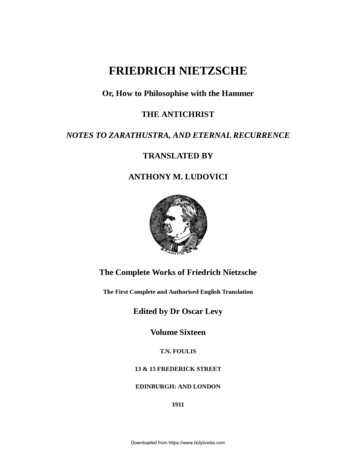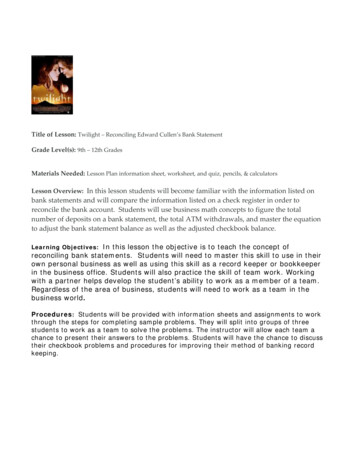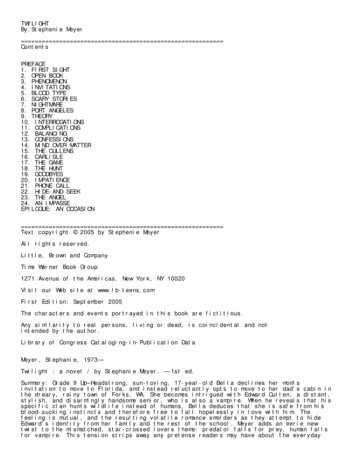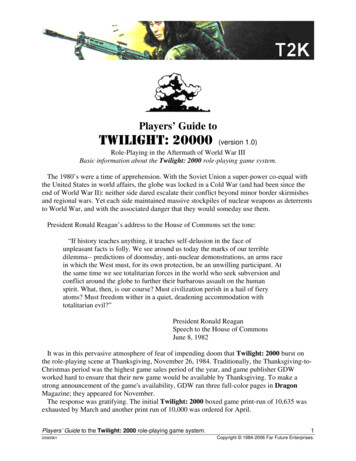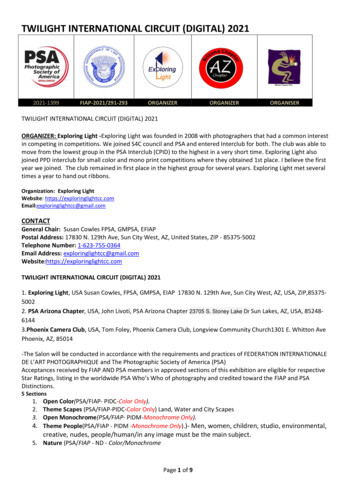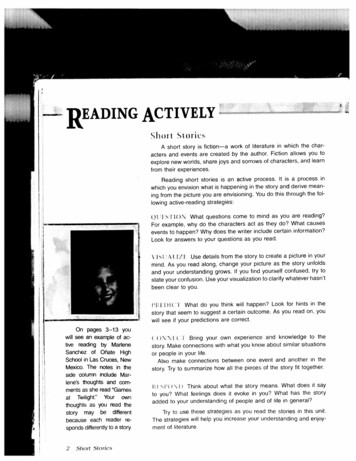
Transcription
FriedrichNietzscheTwilightof theIdolsTranslated byRichard PoltIntroduction byTracy Strong
Twilight-00Book Page i Monday, August 24, 2009 4:52 PMTwilightoftheIdolsBlack process 45.0 133.0 LPI
Twilight-00Book Page iii Monday, August 24, 2009 4:52 PMFRIEDRICHNIETZSCHETwilightoftheIdolsOr,How to Philosophizewith the HammerTranslated byRichard PoltIntroduction byTracy StrongHackett Publishing Company, Inc.Indianapolis/CambridgeBlack process 45.0 133.0 LPI
Friedrich Nietzsche: 1844–1900Twilight of the Idolswas first published in 1889.Copyright 1997 by Hackett Publishing Company, Inc.All Rights ReservedCover Design by Listenberger Design & AssociatesInterior Design by Dan KirklinPrinted in the United States of America4 5 6 710 09For further information, please addressHackett Publishing Company, Inc.P. O. Box 44937Indianapolis, Indiana 46244–0937www.hackettpublishing.comLibrary of Congress Cataloging-in-Publication DataNietzsche, Friedrich Wilhelm, 1844–1900.[Götzendämmerung. English]Twilight of the idols, or, How to philosophize with the hammer/[by Friedrich Nietzsche]; translated by Richard Polt;introduction by Tracy Strong.p.cm.Includes bibliographical references and index.ISBN 0-87220-355-7 ISBN 0-87220-354-9 (pbk.)1. Philosophy. I. Title.B3313.G67131997193—dc21 96-40331CIPISBN-13: 978-0-87220-355-6 (cloth)ISBN-13: 978-0-87220-354-9 (pbk.)Adobe PDF ebook ISBN: 978-1-60384-880-0
Twilight-00Book Page v Monday, August 24, 2009 4:52 PMContentsIntroduction by Tracy Strong. viiBibliography on Nietzsche. xxixTranslator’s Note . xxxiTwilight of the IdolsForeword . 3Epigrams and Arrows . 5The Problem of Socrates . 12“Reason” in Philosophy. 18How the “True World” Finally Became a Fiction . 23Morality as Anti-Nature . 25The Four Great Errors. 30Those Who “Improve” Humanity . 38What the Germans Are Missing. 43Raids of an Untimely Man. 50What I Owe to the Ancients. 86The Hammer Speaks. 92Index . 93vBlack process 45.0 133.0 LPI
Twilight-00Book Page vii Monday, August 24, 2009 4:52 PMIntroductionHammers, Idleness and MusicMusic now brings me sensations such as I have never had before. Ittakes me away from myself, it sobers me up from myself, as if Ioversaw myself from a distance, it gluts my senses (überfühlte) . . .Life without music would be an error, a hardship, an exile.Letter to Köselitz, 1/15/88In the end, what is there for it? There is no other means to bringphilosophy again into honor: one must first hang all moralists.Nachlass, WKG VIII3 p. 4121Friedrich Wilhelm Nietzsche was born on October 15, 1844, in the townof Röcken, near Leipzig. He was the son and grandson of Lutheran ministers. When he was four his father passed away and half a year later ayounger brother suddenly died. He was brought up with his sister by hismother and two aunts. A brilliant and precocious student, he was educated in Schulpforta, one of the top private schools in Germany. He wentfrom there first to Bonn and then to Leipzig to study classical philology.His reputation and recommendations were such that, while still finishinghis studies, he was called to the chair of classical philology at the University of Basel.In 1870, he volunteered as a medical orderly in the Franco-Prussianwar. After his return to the university, he became part of Basel intellectualcircles, in constant contact notably with the historian Jakob Burckhardtand the ethnographer J. J. Bachofen. He became a close, even intimate,friend of Richard and Cosima Wagner, who then were living near Lucernein central Switzerland, and was a frequent visitor at their home.His first work, The Birth of Tragedy from the Spirit of Music, appearedin January of 1872. The book attacked the received wisdom of the time—that the Greeks were people of “sweetness and light,” the “children of therace,” as it were—and it appeared to see in the music drama of RichardWagner the possibility of a rebirth of Greek tragedy in contemporaryGermany. Unsurprisingly, it became the focus of an intense intellectualconflict in German university circles, all the more so for having beenwritten without footnotes and in an occasionally exalted prose style.viiBlack process 45.0 133.0 LPI
Twilight-00Book Page viii Monday, August 24, 2009 4:52 PMviiiTwilight of the IdolsNietzsche was deemed at the time to have lost the intellectual battle.Between 1873 and 1878, he abandoned several works in progress andpublished only the four “Untimely Meditations,” essays on cultural subjects written in the style of Emerson, a writer Nietzsche much admired.In 1878, the first volume of Human-All-Too-Human appeared; the sameyear occasioned his public rupture with Wagner. His health, precarious inthe best of times, was poor enough that he asked to be relieved of histeaching duties at Basel. Granted a small pension, he began a nomadiclife, spending summers in Sils-Maria in southeastern Switzerland and therest of the year in towns in southern France and northern Italy. His writing pace accelerated: he produced Dawn of Day (1881), The Gay Science(1882), Thus Spoke Zarathustra (1883–85), Beyond Good and Evil (1886),On the Genealogy of Morals (1887), and the books of 1888 mentionedbelow. Sales were minimal, as was public recognition until 1887, when theDanish critic Georg Brandes gave a series of public lectures in Copenhagen on Nietzsche’s work.2 On January 4, 1889, Nietzsche collapsed on astreet in Turin. His friend Franz Overbeck brought him back to Germany,where he was hospitalized in an asylum, and then released to the care ofhis mother and sister. His reputation, however, had begun to spreadwidely across Europe and the United States. He died on August 15, 1900,having never recovered his sanity, but already recognized as an importantintellectual figure.The present volume, Twilight of the Idols, was written during the firstweeks of the summer of 1888, the last year of Nietzsche’s life in sanity,the year which saw an intense accelerando in Nietzsche’s already substantial productivity. An enormous, almost compulsive, output of books andletters cascaded from his pen. In the epigraph to Ecce Homo, in life-exultant language reminiscent of the opening paragraph of Emerson’s “Divinity School Address,” he refers to these books as the “gift of the year”3 andcalls particular attention to The Antichrist, the Dionysus-Dithyrambs, andTwilight of the Idols. To those one must add almost three hundred lettersas well as two works on Wagner: The Case of Wagner and a collection ofhis writings on Wagner from throughout his life, Nietzsche Contra Wagner. It was, he wrote to Franz Overbeck, the autumn of his life, his “greatharvest time.”4In this context, Nietzsche’s intention for Twilight is quite clear. In aletter to the composer Heinrich Köselitz (nom de plume: Peter Gast) onSeptember 12, 1888, he writes that he has just sent off to his publisher amanuscript with the title “A Psychologist’s Idleness.”Black process 45.0 133.0 LPI
Twilight-00Book Page ix Monday, August 24, 2009 4:52 PMIntroductionixUnder this harmless title there is hidden a very sharp, precise, andquick digest (hingeworfene Zusammenfassung) of my essential philosophical heterodoxies: this is so that the book can serve to introduceand whet the appetite for my Revaluation of All Values (the firstbook is practically completely worked out). There is a lot in it ofjudgments on the present, on thinkers, writers and such.5In a letter of September 14 to Paul Deussen, he speaks of this book andits immediate predecessor, The Case of Wagner, as “just recuperations(wirkliche Erholungen)” in the course of his greater task, which, whenaccomplished, “will split humanity in halves.” Twilight is a book thatlooks in two directions.6 It summarizes what Nietzsche thought he hadachieved before 1888: a harvest of what he had done during the precedingtwo decades. Furthermore, he thinks of this work—that which he hasaccomplished since the Birth of Tragedy—as preparatory to his life’s creative work, the projected Revaluation of All Values. Nietzsche had difficulty, however, in accepting any of his work as the actual first step of thisnew project. At one point, he seems to have thought of The Antichrist (thevolume referred to in the paragraph above) as the first volume of the newwork. However, he crossed this subtitle out in manuscript and substitutedthe one that it presently bears, “Curse upon Christianity.” It is not therefore apparent that Nietzsche understood anything that he wrote to beother than preparatory for his major philosophy. In any case, it is clearthat Nietzsche intended Twilight to be both an introduction to work thatwas to come and a summary of the critical work that he had engaged inover the preceding eight years. Twilight, as Nietzsche says in his autobiography, is the work of a nunciatory angel.7As he had written to Köselitz, the title of the present book was originally to be “A Psychologist’s Idleness.” An earlier version of the first aphorism: “Idleness is the start of all philosophy. Is philosophy then a sin?”8explains some of what he had in mind. It also recalls Aristotle’s understanding that the beginnings of philosophy were in wonder and raises theissue of the status of philosophy. Upon prompting from Köselitz—whofound it inadequately thunderous—Nietzsche tried out a number of variations and came up with “Twilight of the Idols.” A few things should benoted about the new title. First, in the course of finalizing the new title,Nietzsche twice tried out as a subtitle “How a Psychologist Asks Questions.” In all but the final version, the book is to be called Götzen-Hammer, the Hammer of the Idols.9 The hammer functions, Nietzsche says inthe preface, as a “tuning fork” to the idols, that is, as a way both of ques-Black process 45.0 133.0 LPI
Twilight-00Book Page x Monday, August 24, 2009 4:52 PMxTwilight of the Idolstioning whether or not they sound true when struck while at the sametime sounding a true note. Note that when a tuning fork is used to strike ahollow object there is a resonance from both the object and the fork. Thetwo notes are necessary to the operation.The title resonates in several ways. One is to Francis Bacon and hisattack on “idols of the mind.”10 Nietzsche speaks favorably of Bacon’s“realism,” the trait he draws special attention to as admirable in Thucydides at the end of Twilight. Whatever realism actually is, it is at least notmistaking the world for that which one wants it to be—as he accusesalmost all of Western philosophy in one way or another of doing. Twilightis thus about the accounts of the world that humans want to give to themselves in order to keep themselves from seeing the world (and themselves) as it is. It is thus necessarily also about the reasons that they givethemselves such accounts.Additionally, even more closely in German than in English,Götzendämmerung calls to mind Götterdämmerung, the title of the lastopera in Wagner’s Ring des Nibelungen. Götterdämmerung is an operaabout the end of the reign of the gods. In Götterdämmerung, the reign ofthe gods comes to an end because the gods are unable to live both withintheir own law and justly. The German Dämmerung, like its English translation “twilight,” refers to that time between the dark and the light of day,with no immediate indication of which comes after which. Therefore,“Twilight of the Idols” does not indicate whether it marks a transitionfrom day to night or the other way around. All it claims to do is to soundthe clear note that comes between being out of tune and being in tune:like twilight, it marks the time between what came before and the beginning of that which comes after. It is intended to make it impossible to livewith idols.If we may therefore find in Twilight what will become Nietzsche’s revaluation of values, we cannot look there for the actual revaluation. The finaldateline to the revised preface—“September 30, 1888, on the day whenthe first book of the Revaluation of All Values was finished”—indicatesonly that Nietzsche thought that what he had accomplished in this bookmade possible such a revaluation. It does mark, however, the end of thecourse on which Nietzsche’s life had been set as he came to deal with thelack of understanding with which his first book, The Birth of Tragedy, hadbeen greeted. His hope in the early 1870s for a two-pronged culturalrebirth, led by Wagner’s music and his own sense of the possibilities forpedagogy, had been dashed by the reception afforded his first work.11 Hehad embarked instead on a long critical journey through the social andBlack process 45.0 133.0 LPI
Twilight-00Book Page xi Monday, August 24, 2009 4:52 PMIntroductionxiepistemological structures of the Western world, and by 1888 he finallyfelt that he was at the end of that traverse.With this in mind, how should one read Twilight of the Idols? MichaelGillespie has argued that the organization of the book takes its cue
Twilight is quite clear. In a letter to the composer Heinrich Köselitz (nom de plume: Peter Gast) on September 12, 1888, he writes that he has just sent off to his publisher a manuscript with the title “A Psychologist’s Idleness.” Twilight-00Book Page viii Monday, File Size: 1MBPage Count: 130
